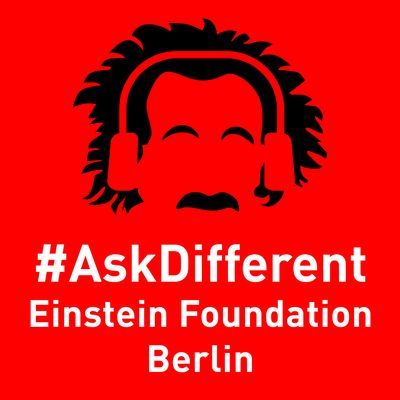In der Podcast-Reihe #AskDifferent erzählen geförderte und mit der Stiftung verbundene Wissenschaftlerinnen und Wissenschaftler von den kleinen Schritten und großen Zufällen, die zu einer außergewöhnlichen Laufbahn geführt haben. Wir wollen wissen: Was treibt sie an, anders zu fragen, immer weiter zu fragen und unsere Welt bis ins kleinste Detail zu ergründen?
/podcast
Gesamtlänge aller Episoden: 13 hours 17 minutes
episode 32: #32: Paul Gellert: Wie kann unsere Gesellschaft erfolgreich altern?
AskDifferent #32 – Neue Familienmodelle, Migration und eine stetig steigende Lebenserwartung: Unsere Gesellschaft verändert sich. Paul Gellert, Professor für Gerontologie und Direktor des Einstein Center Population Diversity, sieht sich diese Veränderungen zusammen mit einem interdisziplinären Team genauer an...
episode 31: : AI and ethics: Do they go together?
If you ask Yves Moreau, we are drunk teenagers losing control of the car we are driving – at least when it comes to artificial intelligence. The 2023 Einstein Foundation Individual Award winner studies biomedical DNA data and describes himself as a “concerned scientist...
episode 30: #30: Tarik Abou-Chadi: Dem Wahlverhalten auf der Spur
Bundestagswahlen sind immer wie Geburtstag, findet der leidenschaftliche Politikwissenschaftler Tarik Abou-Chadi. Schon in jungen Jahren hat er eine steile Karriere bis zur Professur in Oxford hingelegt – auch dank seiner Fähigkeit, mit den richtigen Fragen Debatten anzustoßen. „Ist unsere Parteiendemokratie auch künftig das geeignete System, um große Herausforderungen wie den Klimawandel anzugehen?“, ist nur eine davon...
episode 29: #29: Stefan Hecht : Die Faszination des Lichts
Licht verschafft Wissen, setzt in Szene oder ruft Stimmungen hervor – und ist essentiell für Nachhaltigkeit und Innovation. Doch was ist Licht genau? Wie lässt sich Licht interdisziplinär erforschen und nutzen? Und was hat Licht mit 3D-Druck zu tun? Stefan Hecht ist Berliner, Einstein- Professor für Organische Chemie und funktionale Materialien an der Humboldt-Universität und Mitgründer des Startups „xolo“...
episode 28: #28: Beate Kampmann: The Global Physician
Recent years have taught us that diseases can easily transcend national borders in today's interconnected world. How can we secure health on a global scale, especially when there are such stark disparities between different regions? Beate Kampmann is one of the leading researchers into childhood tuberculosis and vaccines, and Scientific Director of the Center for Global Health at Charité - Universitätsmedizin...
episode 27: #27: ManyBabies5 : Inside a Baby's Mind
What is going on in babies' minds? What do they think and feel? Jessica Kosie and Martin Zettersten are not only looking for answers to these questions - they are cooperating with more than 200 scientists in 40 countries to define the fundamentals needed to establish research globally. The challenges they face are not easy to solve: Since babies are unable to speak, they cannot answer our questions directly...
episode 26: #26: Riccardo Giovanni Urso: Is there Life in Space?
Are we alone in space? What could extraterrestrial life forms look it? And how do we find them? These questions are almost as old as mankind itself. Natural Scientist and former Einstein International Postdoctoral Fellow Riccardo Giovanni Urso tries to answer them every day. In this episode of #AskDifferent, he talks about his scientific journeys through space, basic ingredients for life, and why he would love to be onboard a mission to mars.
episode 25: #25: Paul Ginsparg: The godfather of open access publishing
Preprints have been shared in the physics community since the early 1950s but mostly among well established professors. Physicist Paul Ginsparg, who received the first Einstein Foundation's Individual Award for Promoting Quality in Research in 2021, set out to democratize access to scientific results. Today, his preprint server arXiv has spread to many other fields - and made science progress more efficient and fairer. In this episode, he reflects on his motivation to create arXiv...
episode 24: #24: Anna Löwa: Bleibt kreativ!
Mini-Organe aus der Petrischale: Die Biotechnologin Anna Löwa beschäftigt sich in ihrer Forschung mit sogenannten Organoiden, speziellen Zellkulturen beispielsweise des Gehirns oder der Lunge. Diese Organoide können die Strukturen und Funktionen einzelner Organe darstellen und damit einen Zugang zur Erforschung und Behandlung menschlicher Erkrankungen ermöglichen. Die junge Wissenschaftlerin ist Postdoc am Einstein-Zentrum 3R für alternative Methoden in der biomedizinischen Forschung...
episode 22: #22: Britta Tietjen: Wenn die Spree rückwärts fließt
Mancherorts ist der Wasserstand der langsam fließenden Spree so niedrig, dass sie gar ihre Laufrichtung ändert: ein Beispiel, anhand dessen die Ökologin Britta Tietjen erklärt, wie es um die Ressource Wasser in Berlin-Brandenburg steht. Als Sprecherin der Einstein Research Unit "Climate and Water Under Change (CliWaC)" modelliert Tietjen mögliche Zukunftsszenarien von regionalen Ökosystemen. Foto: Privat...
